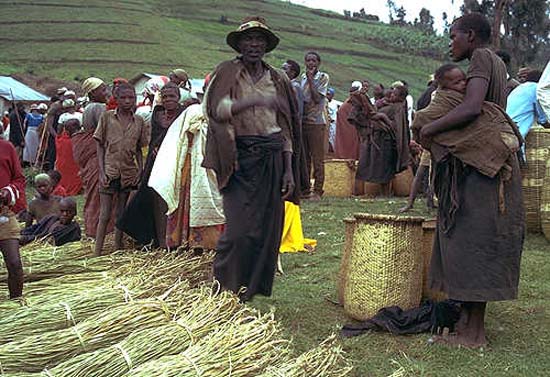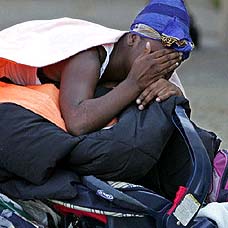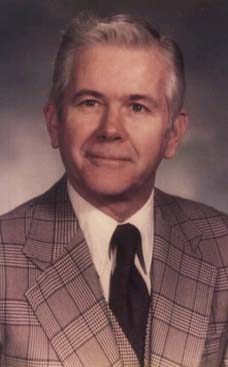
At the core of the Darfur genocide are not tribal hatreds, but mere material interests: access to Darfur's scarce water and arable land, and the desire of the National Islamist Front government in Khartoum to consolidate its control of Sudan's political system after decades of civil war. Most of the attacks in Darfur are conducted by violent Arab militias, known as janjaweed, who are aligned with the Islamist government in an attempt to destroy Darfur's black African ethnic groups.
Togo RPCV Dickovick says: The remote Sudanese region of Darfur is the latest conflict area to glance across our collective consciousness.
NEVER AGAIN? OR AGAIN SOON?
Sep 20, 2005 - Roanoke Times
For many Americans, Africa is a distant and mysterious continent rife with "ancient, tribal hatreds," where even genocide seems endemic. The remote Sudanese region of Darfur is the latest conflict area to glance across our collective consciousness. While television coverage is rare (with the notable exception of PBS), the horrors of Darfur have surfaced just long enough to renew concerns about Africa's seemingly degenerate tribalism. It is to change these perceptions and encourage greater action to stop the ongoing genocide in Darfur that a coalition of more than 100 human rights groups has declared Wednesday a National Day of Action for Darfur.
At the core of the Darfur genocide are not tribal hatreds, but mere material interests: access to Darfur's scarce water and arable land, and the desire of the National Islamist Front government in Khartoum to consolidate its control of Sudan's political system after decades of civil war. Most of the attacks in Darfur are conducted by violent Arab militias, known as janjaweed, who are aligned with the Islamist government in an attempt to destroy Darfur's black African ethnic groups.
Serious observers do not question the relationship between Sudan's government and the janjaweed. Photojournalists and human rights groups have amply documented Sudanese helicopter gunships strafing villages in support of marauders pillaging on horseback or camelback. Khartoum's denials that it supports the janjaweed are reprehensible, a noxious form of officious boilerplate. In fact, their campaign of misinformation is a key ingredient of the genocide: Delaying international intervention ensures that the militias have the requisite time to complete their sinister task.
If there is a single ray of hope in Darfur's horrific situation, it is that international condemnation of the Sudanese government and the janjaweed is nearly universal. Yet the international community has taken scant action to halt the genocide. This recalls the Rwandan genocide of 1994, in which approximately 800,000 Rwandans were killed.
In November 2002, I heard Gen. Romeo Dallaire, commander of United Nations forces in Rwanda during the genocide, address an audience about his experience, now chronicled in his memoir, "Shake Hands with the Devil." Dallaire drew gasps and tears throughout, but the strongest reactions were not to details of corpses and massacres. Rather, the most wrenching story was a recounting of his interaction with an unnamed "Western" diplomat who contemplated intervention. The diplomat asked Dallaire how many Rwandans could be expected to die in the genocide. Dallaire suggested there could be hundreds of thousands.
To which the diplomat replied that his government had calculated that they could afford to lose one of their soldiers for every 85,000 Rwandans killed. Dallaire left little doubt about which country the diplomat represented.
Dallaire then left all of us in that room with a lingering question: "Are all humans human, or are some more human than others?" He referred not to the behavior exhibited by the perpetrators of genocide, but to the value the rest of us place on lives. How do we grapple with how many "others" are worth a given number of "us"?
American foreign policy, of course, is not only about possible benefits, but also costs. Many will argue that Darfur deserves only sincere diplomacy, and no commitments of real resources, much less endangering U.S. troops. America's lack of involvement in Rwanda, for example, is best considered against the backdrop of Somalia, where dead American soldiers had been dragged through dusty streets only one year earlier. American voters have little tolerance for the deaths of American soldiers; witness the slow crescendo of opposition to the military presence in Iraq. Our representatives know any support for intervention in Darfur could quickly sour if a handful of Americans were killed.
Given the state of our national budget, the fiscal cost of meaningful intervention also complicates matters.
Against these weighty considerations of American lives and spiraling deficits, there is one principal argument in favor of greater intervention in Sudan: It is the right thing to do. Innocent though we may be of any acts of commission, Dallaire's question in 2002 asked us what our act of omission meant. We must ask the same of our elected officials now. Given America's global stature, their failure to act in Darfur does implicate them; in a democracy, our failure to demand their action implicates us all. After the genocides of the 20th Century, we have already said "Never again" far too often.
For more information: http://savedarfur.org/
Dickovick, an assistant professor of politics at Washington and Lee University, was a Peace Corps volunteer in Togo for two years in the mid-1990s.












